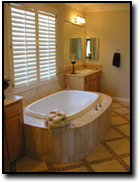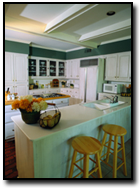Going Green
Conservation Tips
Maintaining the plumbing system in your home is very important. Correcting problems immediately can prevent costly repairs to your home and to the fixtures. Even minor leaks can cause major damage and waste thousands of gallons of water. Before taking on any plumbing repair, always turn off water to the fixture or to the entire house. Click on the links below for helpful maintenance and conservation tips.
Bathroom

Conservation Tip: Fixing a leaking or running toilet will save water, money, and costly repairs in the future. If your toilet is more than 15 years old, installing a new water saving toilet will save you money on your utility bills.
Conservation Tip: Dripping faucets can lose over 100 gallons per day, more than 4000 gallons per month. Fixing problems quickly can save water and money.
Conservation Tip: Replacing old showerheads can save water without compromising water pressure. Old showerheads can use up to 7.5 gallons per minute, while newer ones use as little as 2.2 gallons per minute. Plus, if you are using fewer gallons per minute of hot water, it will keep your shower running hotter for a longer period of time.
TOILETS: Toilets use up to 40% of our total water consumption. Running toilets can waste hundreds of gallons of water each day. If the toilet should have a running water sound, if the toilet fills when it is not in use, or if the toilet doesn t stop running, it is time for a repair. Replacing the flapper, the flush valve, or both will correct this problem. To check for smaller leaks in your toilet tank, turn the water off to the toilet, take the lid off of the tank, mark the water level, and come back an hour or two later to see if the water level dropped. If the water level drops, it is time for a repair. If your toilet leaks at the floor, the wax seal should be replaced. If your toilet is loose or rocks when you sit on it, it probably needs a new wax seal and new toilet bolts. Letting this problem go without correction can cause costly damage to the flooring, and to the ceiling below. If your toilet should clog, attempt to plunge with an ordinary household plunger. If this doesn t correct the problem, different equipment is needed, and you should call a qualified plumbing contractor.
FAUCETS: Repair leaky faucets to save water and prevent further damage to the faucet or the fixture. There are numerous brands of faucets and replacement parts. Be sure to use the correct replacement parts for your faucet. Over time, the aerators on your faucets can become clogged and reduce pressure. To maximize performance, the aerator should be cleaned periodically.
BATH TUBS / SHOWERS: Dripping faucets in the bath or shower also should be corrected to save money and prevent further damage to the faucet, fixture, or home. To keep your drains flowing smoothly and to prevent clogs, clean hair and other debris from the strainer in your tub or shower frequently. If your tub or shower does not have a strainer, you should have one installed to prevent clogs.
Basement/ Utility Room

Conservation Tip: Keeping your water heater set at 120 degrees, or on the medium setting for older models, can save energy.
SUMP PUMPS: Sump pumps and crocks need to be inspected and cleaned at least once per year for proper operation. The cleaner a pumps environment is, the longer is will probably last. Remember, a sump pump is an electric appliance operated by a motor, and it has a limited number of operating hours on it before it fails. If your sump pump is older, it is not a bad idea to have it inspected and possibly replaced. Also, ask about the new battery back-up sump pump systems that will keep you from flooding during power outages, or if your main pump fails. A must have for those of you with finished basements or if you store anything valuable in your basement.
HOT WATER HEATERS: Maintenance on your water heater should be done at least once per year, and preferably twice per year. To flush sediment build up in the tank, drain a few gallons of water from the faucet located at the bottom of the tank. Test the temperature / pressure relief valve on the top or side of the water heater by pulling up on the lever and allowing some water to come out. If the lever is stuck or no water comes out, this fitting should be replaced. This is a safety feature and needs to be operating properly for your protection. Never keep any flammable liquids or solvents near your water heater or furnace. The pilot flame could spark an explosion.
OTHER TIPS: Every month or so, pour some water into your floor drain to prevent sewer gas from escaping. Locate all shut-offs in your home, particularly for the main water and gas to your house. These may need to be turned off quickly during an emergency. Old shut-offs may leak, break, or not shut the water off completely. If this is the case, they need to be replaced immediately. Check with your city and ask them what the water pressure is in your area. Water pressure that exceeds 60 pounds can cause damage to the plumbing system, and installing a pressure-reducing valve and an expansion tank should be considered.
Gas / Propane Leaks: If you detect a gas leak, shut off gas to the appliance immediately and contact a D.O.T. qualified plumbing contractor for this repair. Only qualified / certified technicians are permitted to do this work. If shutting off the appliance doesn t work, go to a neighbor s house and call your gas company immediately. Open windows and doors. DO NOT STRIKE A MATCH OR LIGHTER. Shut off main gas, if you know how. Exit home if gas leak is excessive and wait for the gas company to arrive. Contact only licensed / certified contractors for repairs.
Water Leaks: Use your water meter to check for leaks in your home. During a period when no water is being used, check the meter reading. Several hours later, check the reading again to see if it has changed. If the reading has changed, be sure to check your toilets, faucets, etc. for leaks.
Kitchen

Cleaning Tip: Food grime can build up inside of the garbage disposal, sometimes causing an unpleasant odor. To clean and get rid of the smell, try running the disposal with ice cubes and lemon or orange rinds; while running the water and disposal, put liquid dishwashing detergent in it, or make ice cubes out of vinegar and grind them up in the disposal.
GARBAGE DISPOSAL: If you have a garbage disposal, always be aware of what you are putting into it. Most new disposals can handle almost any food waste, but always avoid putting things like seeds from lemons or grapes, skin from poultry, or grease. Small hard objects can lodge in the teeth, and tough skins can get bound up. Before you attempt to clean or dislodge any material, always turn off power or unplug. When using your garbage disposal, always run the water before, during, and after the use of the appliance to keep drains running smoothly.
